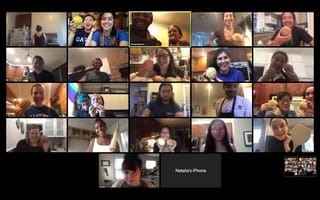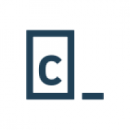What if the company that gave you the skills to begin a new vocation also became the destination for your future career?
Codecademy is renowned for helping people transition into technology careers, including several folks who ended up on their engineering team today. This culture of learning and professional development has allowed Codecademy to build a multifaceted engineering team that takes pride in the platform they are building — specifically because they have had similar experiences to so many of Codecademy’s loyal learners.
To hear more, Built In NYC sat down with Sylvana Santos, Colin Trato and Rebecca Borison, three software engineering pros who all took nonlinear paths to technology. They told us their personal stories of how Codecademy not only taught them how to code, but also how it became the ideal place to grow in their new professions as software engineers.

Sylvana, how did you get started at Codecademy?
Santos: Before working at Codecademy I was a teacher. I had always been very passionate about mentorship and education, so I taught for a couple of years, really enjoyed it, and was very passionate about helping kids see the value in education and get excited about learning. It was so rewarding when kids had their “aha” moment.
But I remember always feeling frustrated that not all kids were getting the same quality education. Even within the same school, you had different teachers who had different priorities. So that's when I started to think about coding — I’d noticed that there were a lot of ways technology helped excite kids and get them on equal footing in the classroom. And so I figured that if I could get into software engineering, I could work on products that would help level the playing field in education. I wanted to be able to reach more than just the 30 kids that were in front of me.
It was exciting to think about software engineering as a way to do that. I started using Codecademy to learn those skills while I remained a teacher, which I think speaks a lot to how feasible it is to do Codecademy on the side — anyone who’s been in education knows that teaching takes a lot of work. Once I was able to get to a certain level of proficiency, I applied for boot camp before joining the apprenticeship program at Codecademy. I cannot speak highly enough about the apprenticeship program. It’s such a great way for people with non-traditional tech backgrounds to ease themselves into the software engineering world. Not only do you build the tech skills, but I also think the apprenticeship program helps build your confidence in a very difficult field. After the apprenticeship program, I eventually converted to full time at Codecademy and I'm very grateful to be here.
I cannot speak highly enough about the apprenticeship program. It’s such a great way for people with non-traditional tech backgrounds to ease themselves into the software engineering world.”
You were paired with a mentor in the apprenticeship program. How was that experience for you?
Santos: It was really great. Codecademy tries to pair you with someone who’s had a similar journey, and maybe even went through the apprenticeship program themselves. It helps you battle the “imposter syndrome” a bit because you’re being mentored by someone who came from a similar background. Codecademy also helped connect me to other senior engineers at the company who were all really welcoming.
You just touched on something that other new engineers might relate to — can you talk more about imposter syndrome?
Santos: Imposter syndrome is the feeling that you don’t belong or that everyone else is great at their job and you are that one oddball who has no idea what you’re doing. It’s a feeling of not belonging. I think Codecademy has been really great at helping me get past that.
Everyone at the company — and particularly senior engineers and managers — are very transparent about their gaps in knowledge. All the engineers that I look up to are still constantly asking questions at meetings or in pairings. That transparency really helps when you are a junior, because they will even come to you with questions. You’ll be surprised at how quickly you build a little expertise once you start dipping your toes in code.
Colin, how did you get started as a software engineer?
Tatro: My original job was working in reality TV. There wasn’t a lot of money in it, and I wanted to make a switch. I managed to get a job working in IT, but eventually I had to question if that would make me happy, because in IT you end up doing a lot of repetitive tasks.
Some software engineers began looking into automating those aforementioned repetitive IT tasks, and while coordinating with them, I got a lot of exposure into their world. That’s when I realized I liked doing that stuff and wanted to learn more. Codecademy was the first platform I tried, and I learned how to write JavaScript there. That was the very beginning of my journey, which put me on the path to becoming a full-time web developer.
Were you able to keep your previous job while learning how to code?
Tatro: Absolutely. I told my boss that I found a really cool website called Codecademy that was going to let me learn JavaScript for free. I was able to not only keep my old job, but also take classes from Codecademy while on the job.

After gaining those skills, how did you then get a job at Codecademy?
Tatro: Something I realized was that if I wanted to fast-track a career in engineering, I needed to quit my job and start looking for work. That was a very difficult point, because not a lot of companies want to give someone that first shot as a software engineer. But Codecademy has a wonderful apprenticeship program which Sylvana went through as well. I applied to the apprenticeship program, took the code challenge and then managed to convert to a full-time engineer at Codecademy from there.
What was specifically helpful about the apprenticeship program at Codecademy?
Tatro: First off, they pair you with a mentor who you meet with on a daily basis. The mentor helps you wade into a large production codebase and makes it a whole lot less intimidating for someone who’s at the beginning of their career. They also give you a lot of hands-on stuff to do. Within the first week, my mentor was like, “OK, this is your first project. Here’s a design spec, are you ready to get started and go?” That was fantastic.
I’ve had other friends who did equivalent programs, and they were sometimes sitting for six months not actually committing code. At Codecademy, we want our apprentices to commit code within their first few weeks.
I’ve had friends who did equivalent programs, and they were sitting for six months not actually committing code. At Codecademy, we want our apprentices to commit code within their first few weeks.”
Is there a level of satisfaction in working for a company that also taught you your software engineering skills?
Tatro: Absolutely. I think that if you didn’t go to school for computer science, you hear the word code and you think of the movie “The Matrix” or something, and assume it’s really intimidating. But in reality it’s just about deciding to take the time to learn it. From my perspective, I think it’s really cool to be able to give other people that same sort of confidence to take the first steps into a career in technology.
What’s it like working as an engineer at Codecademy?
Tatro: It’s a very collegial atmosphere where everyone has a mission. We are all very driven by our mission and our values. I think one of the values that sticks with us most is improving relentlessly. We always talk about how we can build on new things, and we always set personal goals and team goals. Everyone’s really enthusiastic, and no one here is just punching in and punching out. Everyone wants to apply their own creativity, and that’s a very motivating atmosphere to be in.
Rebecca, you started as a journalist — how did you end up working with code?
Borison: I was an English major in college and had never thought at all about tech. But the first offer I got was for this mobile tech and mobile commerce trade publication.
I knew nothing about mobile tech and mobile commerce, but all of a sudden I was writing three articles about that a day. I started reading more about it, and I was interviewing people who worked on these different mobile tech startups. During this time, I actually started teaching myself how to code on Codecademy, just for fun.
It’s good to know that I have the potential to improve someone’s life going forward.”
How did this lead you to working for Codecademy?
Borison: The trade publication I was working for had a temperamental content management system, so I would have to go in and edit the HTML just to get my story to load properly. I learned how to make something in italics with an HTML tag and things like that. I think it was a mix of playing around in HTML and reading more about the tech industry that made me realize that it was very interesting. I always liked puzzles.
I finally realized journalism was not the future for me, and I applied to a coding bootcamp, before eventually ending up at Codecademy.
What made Codecademy the right place for you?
Borison: It’s similar to what Colin was saying — being able to give back to a platform that helped me learn how to code originally. I also was looking for a place where I could feel like the code I was writing would be net positive in the world. And that can be a kind of corny thing to say in tech, that we’re changing the world. But it’s good to know that I have the potential to improve someone’s life going forward.








